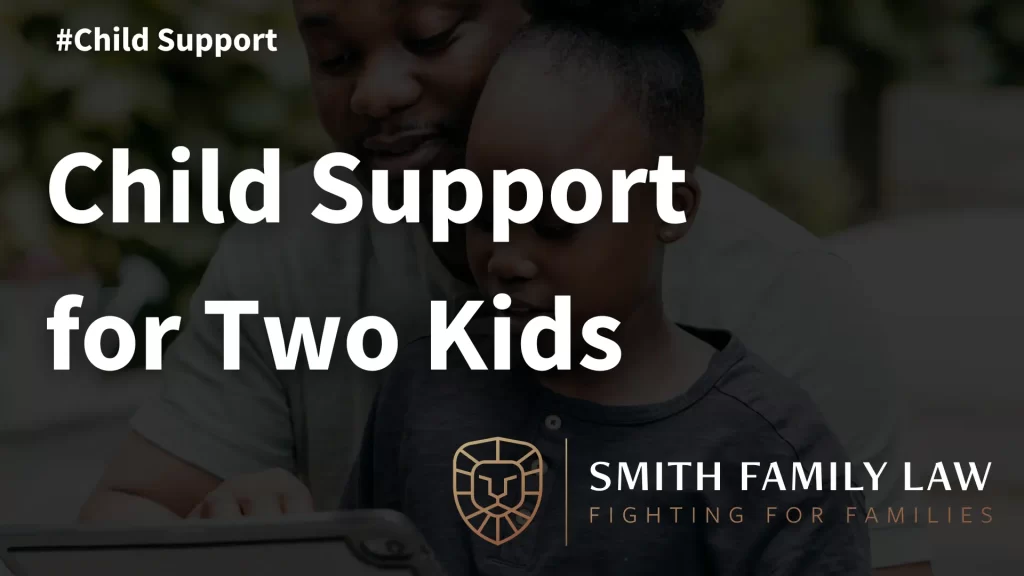As a parent figuring out child support, you may be facing many uncertainties and challenges, especially if you’re responsible for supporting two children. Don’t know how much child support for 2 kids you need?Determining the amount of child support you owe, understanding how child support is calculated, and knowing the consequences of failing to pay are all critical aspects of this process.
How Much Child Support for Two Kids?
You may ask, “How much child support for 2 kids do you need?” The answer to this question depends on several factors, including your income, the other parent’s income, and the custody arrangement.
Texas law dictates that child support will be calculated using a percentage of the paying parent’s net income. For two children, the percentage is 25%. If you’re the parent required to pay child support and your net monthly income is $4,000, you can expect to pay approximately $1,000 per month.
However, this is just a general guideline. The amount of child support you owe may vary, depending on your circumstances. For example, if you have a high income or your children have special needs, the court may order you to pay more than the standard percentage. Alternatively, if you’re a low-income parent, the law dictates that your child support payments will be 20% of your income.
Is Child Support Based on Income?
Yes, child support calculations heavily depend on the income of the parents. The more a custodial parent earns, the more they typically contribute towards child support. The court can consider both parents’ incomes when calculating child support. This includes salary, wages, bonuses, commissions, and other forms of income. If a parent is self-employed or has irregular income, the court may use an average of their income over time to determine their child support obligation.
It’s important to note that the court may also consider other factors when determining child support, such as:
- The needs of the children
- The ability of each parent to contribute to the children’s support
- The amount of time each parent spends with the children
- Any special expenses, such as medical bills or educational costs
In some cases, the court may deviate from the standard child support guidelines if it finds that doing so is in the children’s best interests.
Can You Go to Prison for Not Paying Child Support?
Failing to pay child support is a serious matter that can result in significant consequences, including prison time. In Texas, failing to pay child support is considered contempt of court. It can also be considered criminal nonsupport under the Texas penal code, and it’s a state jail felony that has a penalty of up to two years in jail.
The specific consequences for failing to pay child support depend on the circumstances of your case. For example, if you’ve only missed a few payments and can catch up quickly, you can avoid serious penalties. However, you may face more severe consequences if you’ve consistently failed to pay child support over a long period.
In some cases, the court may issue a warrant for your arrest if you fail to pay child support. If police arrest you, you may be held in jail until you can pay the outstanding child support or until you reach an agreement with the court to catch up on your payments.
It’s important to understand that going to prison for failing to pay child support is a last resort. The court typically prefers to work with parents to find a solution that allows them to meet their child support obligations. This may include modifying the child support order, setting up a payment plan, or finding alternative ways to provide support, such as providing health insurance or paying for childcare.
Modifying Child Support
If you’re obligated to pay child support or if your financial circumstances have changed, you may be able to modify your child support order. In Texas, either parent can request a modification of child support if:
- It has been at least three years since the child support order was established or last modified or
- There has been a material and substantial change in circumstances since the order was established or last modified.
A material and substantial change in circumstances may include:
- A significant increase or decrease in either parent’s income
- A change in the child’s living arrangements
- A change in the child’s needs, such as new medical expenses or educational costs
- The loss of a job or other financial hardship
Acting quickly is essential if you believe you qualify for a child support modification. You can petition to modify child support with the court that originally issued the child support order. An experienced family law attorney can help you navigate this process and present a strong case for modification.
Enforcing Child Support
If you’re the parent receiving child support and the other parent has failed to pay, you have options for enforcing the child support order. In the state of Texas, the Attorney General’s Office enforces child support orders. They have several tools at their disposal, including:
- Wage garnishment
- Tax refund intercept
- License suspension
- Liens
- Passport denial
If you’re having trouble collecting child support, contacting the Attorney General’s Office for assistance is important. They can help you enforce the child support order so your children receive the financial support they need and deserve.
Protecting Your Rights
Don’t know how much child support for 2 kids you need? At Smith & Bledsoe Family Law, our Austin child support lawyers understand parents’ challenges when dealing with child support cases. Our compassionate and knowledgeable attorneys are here to help you every step of the way. Whether you need assistance establishing a child support order, modifying an existing order, or enforcing an order, we have the skills and experience to help you achieve your goals.
If you’re facing child support issues and need guidance, we encourage you to contact us online or call our office at (512) 277-3166 to schedule a consultation. During your consultation, we’ll listen to your story, answer your questions, and provide the information you need to make informed decisions about your case. Our firm will work with you to develop a strategy that protects your rights and helps you provide for your children’s needs.

